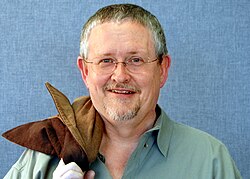Orson Scott Card Quote
There's always moral instruction whether the writer inserts it deliberately or not. The least effective moral instruction in fiction is that which is consciously inserted. Partly because it won't reflect the storyteller's true beliefs, it will only reflect what he BELIEVES he believes, or what he thinks he should believe or what he's been persuaded of. But when you write without deliberately expressing moral teachings, the morals that show up are the ones you actually live by. The beliefs that you don't even think to question, that you don't even notice-- those will show up. And that tells much more truth about what you believe than your deliberate moral machinations.
There's always moral instruction whether the writer inserts it deliberately or not. The least effective moral instruction in fiction is that which is consciously inserted. Partly because it won't reflect the storyteller's true beliefs, it will only reflect what he BELIEVES he believes, or what he thinks he should believe or what he's been persuaded of. But when you write without deliberately expressing moral teachings, the morals that show up are the ones you actually live by. The beliefs that you don't even think to question, that you don't even notice-- those will show up. And that tells much more truth about what you believe than your deliberate moral machinations.
Related Quotes
She might not have read many books. But when she reads a book, she swallows the very words. If you open the books on her shelves, you will find that the front and back covers encase white pages.
About Orson Scott Card
Card, who is a great-great-grandson of Brigham Young, was born in Richland, Washington, and grew up in Utah and California. While he was a student at Brigham Young University (BYU), his plays were performed on stage. He served in Brazil as a missionary for the Church of Jesus Christ of Latter-day Saints (LDS Church) and headed a community theater for two summers. Card had 27 short stories published between 1978 and 1979, and he won the John W. Campbell Award for best new writer in 1978. He earned a master's degree in English from the University of Utah in 1981 and wrote novels in science fiction, fantasy, nonfiction, and historical fiction genres starting in 1979. Card continued to write prolifically, and he has published over 50 novels and 45 short stories.
Card teaches English at Southern Virginia University; he has written two books on creative writing and serves as a judge in the Writers of the Future contest. He has taught many successful writers at his "literary boot camps". He remains a practicing member of the LDS Church.
